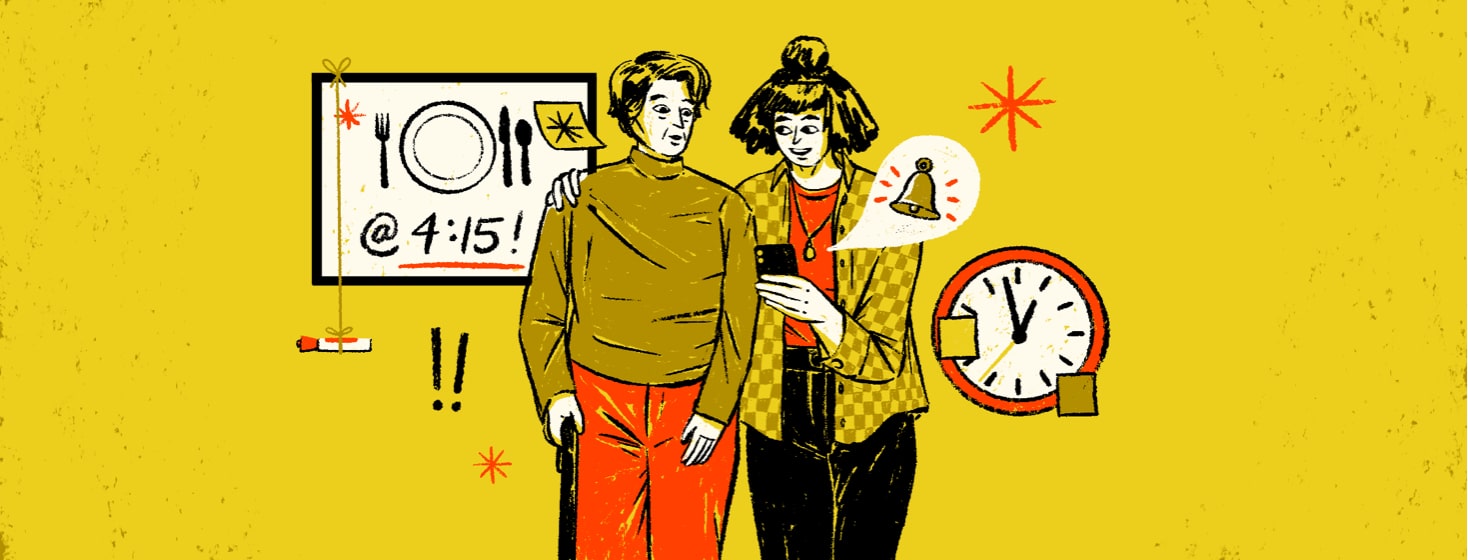Managing Routine and Inevitable Changes in Routine
When we begin reading online about Alzheimer's disease, one of the key takeaways is about routine, routine, routine, and how it is important for people living with dementia!
But, what if that routine is changing, or about to change? Whether it's planned or sudden, stuff happens, and routines do have to change, whether it's just for a day or for the longer term.
What then? How do we best prepare and manage routine changes with Alzheimer's as it approaches — or an unplanned one as it comes up?
Enter the dining room: A change in routine
My grandma moved into an assisted living complex in early April, which also coincided with some of our strictest public health measures for COVID-19 that we've had yet in our province. While she and the other tenants in her building have been fully vaccinated since mid-April, the majority of the outer community has not been. This means they have been subject to the same strict public health measures in their micro-system of an apartment community.
Their store was subject to capacity restrictions. The dining room capacity was restricted based on public health orders for indoor dining; exercise classes are allowed only as gyms are allowed to operate, and church was limited to 25 percent capacity.
As the dining room has been closed to all but a grab-and-go tea or coffee throughout the day, breakfast and dinner have been being served to tenants in their apartments since my grandma moved in. A nice way to ease into the new routine, to be sure, but now the rules are changing. Restaurants are now allowed to admit fully vaccinated people, or people who live together, to eat together and, as such, the dining room has reopened!
The reopening of the dining room is exciting. It provides a much easier opportunity to meet neighbors and make new friends! But with that comes adjusting to the change in routine that no longer involves a friendly dietary aide knocking at the door with meals.
Adjusting to routine change with dementia
While a lot of articles underscore the importance of routine for people with dementia, they don't necessarily tell you how to go about helping someone through the change that is inevitable in life. Whether it's a change of a caregiver or having to remember to go down to the dining room at 4:15 pm for your dinner.
Because I can't find a lot of information about how to manage this, I'm presuming others have also had to come up with their own methods, and we'd love to hear about those in the comments! Here are some of the things we've discussed as a family, as well as some strategies I've used working with kids and young adults with intellectual disabilities that may help some with changes in routines.
Phone reminders!
If you're a sole care provider for someone living independently with dementia, all the phone reminders may get exhausting, but they can be worthwhile to keep things going smoothly. I always say to my own mom, who has three siblings to share the load with.
I've also considered the role a Google Home or similar could play here, with audible daily reminders for tasks and maybe a cheat sheet for how to respond or ask it to do things, ie. "hey Google/okay Google!," while encouraging more independence.
Written schedules
A whiteboard or other at-a-glance schedule to show things throughout the week. Tasks can even be erased or crossed out as they are done to avoid visual clutter, or upcoming days covered up until they arrive.
There are also clocks that can indicate what a person is supposed to be doing at a certain time. Many of these can be DIY options with cheap dollar store clocks in which the back can be replaced with a color-coded prompt of what a person is to be doing when.
The clock, of course, only works if they consistently look at a clock rather than a watch, though if your person is techy enough - an Apple Watch or other smartwatch can offer some help here too!
Talk about it, talk about it, talk about it!
When I've worked with kids, they always want to know what's happening and what's next. Even if you may have to continue to repeat the change in routine with someone with memory loss, sometimes it will just stick! When possible, prepare in advance for changes in routine by discussing what will be happening regularly... Until that routine comes and sticks.
For unplanned changes or emergencies, my only real strategy is explaining what is about to happen, but how we'll get back to the normal routine.
"We're going to go out to the park now, but you'll be back in time for [next usual activity on their schedule]," and continuing to provide reminders of this.
What strategies have worked for your family or loved one with Alzheimer's?
Keep in mind, while we've managed a move and the subsequent change in routine we haven't gone through this "getting to the dining room on time" change yet! Just as the community is, we too are looking for strategies to ease this transition and future ones.
Let us know in the comments how you manage routine changes with Alzheimer's disease when they occur!

Join the conversation